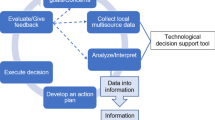Abstract
In response to the increasing influence of practice theory perspectives for studying organisational and inter-organisational information systems, we demonstrate that an important dilemma from this perspective for data collection methods is between authentic access to practices and the ability to thematize knowledge of practices. We propose a promising new approach to this dilemma that uses the learning experiences of novice practitioners to collect data as they are progressively enrolled in the practice, and describe two instantiations of this new approach, practice probes and learning communities.
Similar content being viewed by others
References
Baskerville, R. L., & Myers, M. D. (2004). Special issue on action research in information systems: making is research relevant to practice – foreword. MIS Quarterly, 28(3), 329–335.
Baskerville, R. L., & Wood-Harper, A. T. (1996). A critical perspective on action research as a method for information systems research. Journal of Information Technology, 11(3), 235–246.
Blackler, F., & Regan, S. (2009). Intentionality, agency, change: practice theory and management. Management Learning, 40(2), 161–176.
Cicourel, A. V. (1964). Method and measurement in sociology. New York: The Free Press.
Dreyfus, H. L. (1992). Being-in-the-world: a commentary on Heidegger’s being and time, division I. Cambridge: The MIT Press.
Feldman, M. S., & Orlikowski, W. J. (2011). Theorizing practice and practicing theory. Organization Science, 22(5), 1240–1253.
Gaver, B., Dunne, T., & Pacenti, E. (1999). Cultural probes. Interactions, 6(1), 21–29.
Gherardi, S. (2009). Introduction: the critical power of the ‘practice lens’. Management Learning, 40(2), 115–128.
Giddens, A. (1984). The constitution of society -- Outline of the theory of structuration. Berkley et al.: University of California Press.
Hult, M., & Lennung, S.-A. (1980). Towards a definition of action research: a note and bibliography. Journal of Management Studies, 17, 241–250.
Jones, M. R., & Karsten, H. (2008). Giddens’s structuration theory and information systems review. MIS Quarterly, 32(1), 127–157.
Kubicek, H. (1992). The organization gap in large-scale EDI systems. In R. J. Streng, C. F. Ekering, E. van Heck and J. F. H. Schultz (Eds.), Scientific research on EDI - “Bringing worlds together”, Proceedings of the EDISPUUT Workshop, May 6th and 7th, 1992 (pp. 11–42). the Netherlands Alphen aan den Rijn: Samsom Publishers.
Lave, J., & Wenger, E. (1991). Situated learning – Legitimate peripheral participation. Cambridge: Cambridge University Press.
Lederman, R., & Johnston, R. B. (2011). Decision support or support of situated action: lessons for system design from effective manual systems. European Journal of Information Systems, 20, 510–528.
Levina, N. (2005). Collaborating on multiparty information systems development projects: a collective reflection-in-action view. Information Systems Research, 16(2), 109–130.
Levina, N., & Vaast, E. (2005). The emergence of boundary spanning competence in practice: implications for implementation and use of information systems. MIS Quarterly, 29(2), 335–363.
Linstone, H. A., & Turoff, M. (1975). The Delphi method: Techniques and applications. Reading: Adison-Wesley.
Morgan, D. L. (Ed.). (1993). Successful focus groups: Advancing the state of the art. Newbury Park: Sage.
Neuman, W. L. (2000). Social research methods: Qualitative and quantitative approaches (4th ed.). Boston: Allyn and Bacon.
Nicolini, D. (2009). Articulating practice through the interview to the double. Management Learning, 40(2), 195–212.
Olson, M. (1965). The logic of collective action – Public goods and the theory of groups. Cambridge: Harvard University Press.
Orlikowski, W. J. (1992). The duality of technology: rethinking the concept of technology in organizations. Organization Science, 3(3), 398–427.
Orlikowski, W. J. (2000). Using technology and constituting structures: a practice lens for studying technology in organizations. Organization Science, 11(4), 404–428.
Orlikowski, W. J., & Iacono, C. S. (2001). Research commentary: desperately seeking the “IT” in IT research – a call to theorizing the IT artifact. Information Systems Research, 12(2), 121–134.
Reckwitz, A. (2002). Toward a theory of social practice – a development in culturalist theorizing. European Journal of Social Theory, 5(2), 243–263.
Reimers, K. & Johnston, R. B. (2008). Explaining persistence and resilience of inter-organisational information systems: Theoretical and methodological considerations, in proceedings of the 16th european conference on information systems, Galway, Ireland, June 9–11, 2008.
Reimers, K., Johnston, R. B., & Klein, S. (2010). The difficulty of studying inter-organisational IS phenomena on large scales: Critical reflections on a research journey. Electronic Markets 20(3-4), 229–240.
Reimers, K., Johnston, R. B., & Klein, S. (2012). Evolution of inter-organizational information systems on long timescales: A practice theory approach. In K. Vaidya (Ed.), Inter-organizational information systems and business management: Theories for researchers (pp. 38–54). Hershey: IGI Global.
Ringberg, T., & Reihlen, M. (2008). Toward a socio-cognitive approach to knoweledge transfer. Journal of Management Studies, 45(5), 912–935.
Schatzki, T. R. (2005). The sites of organizations. Organization Studies, 26(3), 465–484.
Schein, E. H. (1992). Organizational culture and leadership (2nd ed.). San Francisco: Jossey-Bass.
Simon, H. A. (1976). Administrative behavior. A study of decision-making processes in administrative organizations. N.Y.: Collier Macmillan Publishers.
Susman, G. I., & Evered, R. D. (1978). An assessment of the scientific merits of action research. Administrative Science Quarterly, 23(4), 582–603.
Venkateswaran, R., & Prabhu, G. N. (2010). Taking stock of research methods in strategy-as-practice. The Electronic Journal of Business Research Methods, 8(2), 156–162.
Wenger, E. (2002). Communities of practice – Learning, meaning, and identity. Cambridge: Cambridge University Press.
Zucker, L. G. (1977). The role of institutionalization in cultural persistence. American Sociological Review, 42, 726–743.
Acknowledgments
This research has been supported by the German National Science Foundation (Deutsche Forschungsgemeinschaft, grant number 1328/3-1), the National Natural Science Foundation of China (grant numbers 70890081, 70972029, 71110107027, 70831003, 71273151), and the Beijing Municipal Science and Technology Commission (grant number Z07020600290793).
Author information
Authors and Affiliations
Corresponding author
Additional information
Responsible Editor: Hans-Dieter Zimmermann and Nilmini Wickramasinghe
Rights and permissions
About this article
Cite this article
Reimers, K., Johnston, R.B., Guo, X. et al. Novice-based data collection methods for the study of IOIS: practice probes and learning communities. Electron Markets 23, 285–293 (2013). https://doi.org/10.1007/s12525-013-0126-6
Received:
Accepted:
Published:
Issue Date:
DOI: https://doi.org/10.1007/s12525-013-0126-6
Keywords
- Inter-organisational information systems (IOIS)
- Research methods
- Data collection
- Practice theory
- Communities of practice
- Embodied knowledge




